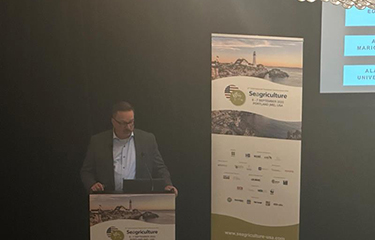Alaska is pushing for an increase in mariculture and kelp-farming sites across the state in an attempt to provide employment opportunities for Indigenous Alaskans.
At the second annual Seagriculture conference, a seaweed and mariculture conference taking place 6 and 7 September in Portland, Maine, U.S.A., Markos Scheer, the founder and CEO of Craig, Alaska-based mariculture firm Seagrove, touted the latest investments and innovation slated for Alaska’s mariculture sector.
After working in the seafood industry for over 20 years, Scheer pivoted to focus on mariculture and kelp restoration initiatives in Alaska.
“One of the reasons I wanted to do this is we have this unique opportunity in Alaska to develop a transformational change in the economic model,” Scheer said.
Referencing his firsthand experience, Scheer described the growth in the sector and highlighted the value of mariculture to local Alaskan communities. The Alaskan mariculture industry is currently valued at USD 1.5 million (EUR 1.3 million), with seaweed as its top product. According to Scheer, over the next 10 years, it’s likely to increase to a minimum value of USD 7 million (EUR 6.5 million), a realistic estimate of USD 60 million (EUR 55 million), and has a ceiling of about USD 185 million (EUR 172 milion), dependent on future investment.
“I really think it’s important to highlight the potential Alaska represents,” Scheer said.
Scheer said Alaska's three major industries – seafood, timber, and tourism – all have experienced major declines due to climate change. Another issue facing the state is unemployment; the unemployment rate in rural Alaska is 8.8 percent compared to 7.4 percent in urban Alaska. Scheer said mariculture could help to reverse both of those trends, and could especially benefit Alaska's rural Indigeneous population.
“We have this opportunity to positively affect communities across coastal Alaska and create these economic opportunities,” Scheer said.
Scheer teamed up with the Alaska Fisheries Development Foundation to help launch the Alaska Mariculture Initiative in 2013, and helped author a concept paper that outlined a route to grow Alaska's mariculture sector to USD 1 billion (EUR 893 million) in value.
That effort got a boost in June 2023, when NOAA announced it is working with Alaska's government to explore the creation of one or more aquaculture opportunity areas in state waters.
“These areas will be identified through a science-based public process that allows constituents to share their community, tribal, and stewardship goals for aquaculture development in Alaska coastal waters,” NOAA Fisheries Director of Aquaculture Danielle Blacklock said.
The third annual Seagriculture conference will move from Portland, Maine, to Ketchikan, Alaska, in September 2024.
Photo by Bhavana Scalia-Bruce/SeafoodSource







